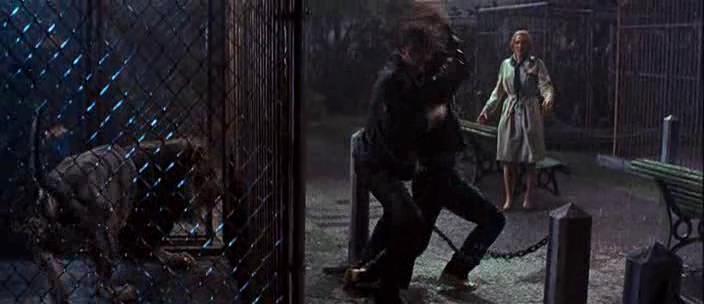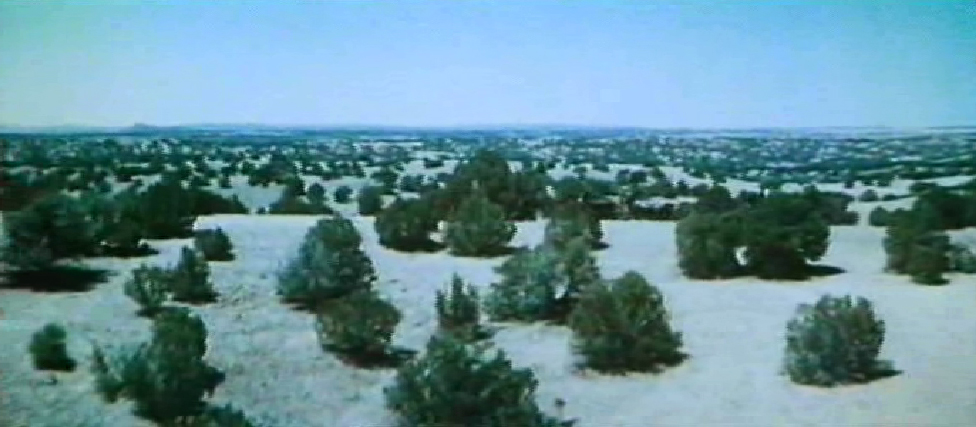The
Joe Louis Story
After a brief
allusion to Golden Boy (dir.
Rouben Mamoulian), this moves meticulously into the training of a great
boxer, and good clips from his bouts with Primo Carnera, Max Baer (Louis in
terrific, workmanlike fighting), Max Schmeling (Louis out of shape and
overmatched), the champion Braddock, Schmeling again (Louis in precision), plus
footage of the 1942 “Night of Stars” at the Garden, and
Louis’s WWII tour, ending with his final fight with Rocky Marciano (Louis
out in harness).
The Dark Gate
Bonanza
Doc names the
episode, an image of madness. Cattle are missing, overbranded (the Ponderosa
pine-tree brand, a vertical bar with three crossbars diminishing upward, burned
over by a letter ess and vertical bar for the Silver Dollar Ranch). A friend of
Adam’s conceives a jealousy over a nonexistent love affair his own wife
has taken up. She’s beaten.
Adam takes her to
the Ponderosa, the friend fires all his hired hands and takes on a crew of
robbers. Bullion is taken from a stagecoach, he wants the Ponderosa, kills the
wanted man who heads the gang, kills his wife, heads for the rocks, where Adam
has to take a shotgun to him. The old friend no longer recognizes anyone,
wounds Adam and is shot. Dying, it all comes back to him with a delay,
it’s his wedding anniversary, their fifth, which happened nearly a year
before. The friend dies, Adam weeps.
Black Zoo

Conrad’s
Animal Kingdom, a zoo on the Hollywood bus tour.
A Valley
developer wants it very badly for tract houses, a
“girl snooper” is the first to go, Dali style, in Westwood.
Gordon closes the
gates for the evening, iron bars fill the screen.
“Influence
on the city council” he has, the Valley developer, families are moving
in, says he. A lion eats him chez lui, “a hilltop house, south
of Encino.”
Suspects are not
wanting, “there’s a kook near Chatsworth that keeps a mountain lion
for a pet.”
Mrs. Conrad
drinks away the daily grind of “chimps, cats and tours,” her
husband’s mute “cow-eyed” son endures “this everlasting
loneliness” as an attendant in the place and feels ruth
over feeding a sadistic colleague to a lion at his father’s command, all
the big cats pay their last respects to the tiger he killed for spite. The
deepest inside joke is on the transmigration of Hollywood souls and those who
accomplish it, wearing the mantle so to speak, hide and hair. Conrad plays the
organ for his menagerie in the living room, “even in death the continuity
of life must not be broken.” The wife, not “really one of
us”, and her chimps get a Broadway offer, in a manner of speaking. “You
simply have to do something about your career!” A gorilla, of course,
drops the lady agent like a deadbeat actor, in Hollywood.
“And
don’t leave out the special farms where they train animals for public
performances,” the Hitchcock joke, “leave no-one out,” he provides the flashback,
at the sight of the first Mrs. Conrad being “lionized”, his mother,
the boy was struck speechless.
The movies are a
zoo that dwells in darkness, nothing neither way to critics.
TV Guide,
“a sensational melodrama about a madman who belongs to a sect that
worships animals and feels that the animals take on human souls.” Eleanor
Mannikka (All
Movie Guide), “violent, gore-filled, effective”. Halliwell’s
Film Guide, “stultifyingly inept”.
Tarzan and the Jungle Boy
The geologist’s son, lost years before.
The search for him by a National Geographic
photojournalist and her associate or assistant happens to coincide with a local
event of some importance, the athletic contest between two brothers to decide
the new chief.
The boy is quite
at home, just as Tarzan had been, his leopard kitten has grown up with him, he
has a chimpanzee friend as well.
The defeated
rival tries to usurp the throne, the boy is sought in sacred tribal lands.
Variety found a “customary brand of jungle
antics”.
The
Gatling Gun

The “instrument of hell” in Apache country,
Two-Knife burning and slaughtering, the preacher and his stepdaughter (cf. Endfield’s Zulu), residual bitterness in the years
after Appomattox.
For the gun, vd. the extensive remarks in Russell’s Prisoner of Honor. A weapon to end war,
fought over. A fairly classical ideal, Pat Buttram in
the comic role, New Mexico landscapes, as a foil to the argument. Bribery and
treason for openers. “La pistola
real” the Apaches call it (King
Gun is said to have been the film’s title early on), with a
suggestion of Mao on power. Jockeying for position among the several
viewpoints, which winnow out to a hillside defense like the one in Huston’s
The Treasure of the Sierra Madre.
Dos Cuchillos (whose name evokes a war
on two fronts, even to the knife twice-over) shoots a brave whose aim is poor.
“ˇEstúpido!
ˇTonto!” The successful employment of the
gun finally is remembered in Ritchie’s The Island. There is a sense of Custer avenged and something else.
“What do you think, Lieutenant?”
“I don’t know. They didn’t have a chance
against this gun.” Huston answers that in The Life and Times of Judge Roy Bean, Gordon ends on the ghastly
face of the terribly defeated Apache chief, who doffs his blue Cavalry jacket (cf. Daves’
Drum Beat) and retires to his horse,
thoroughgoingly Japanese.
TV Guide, “tired
and ragged”.